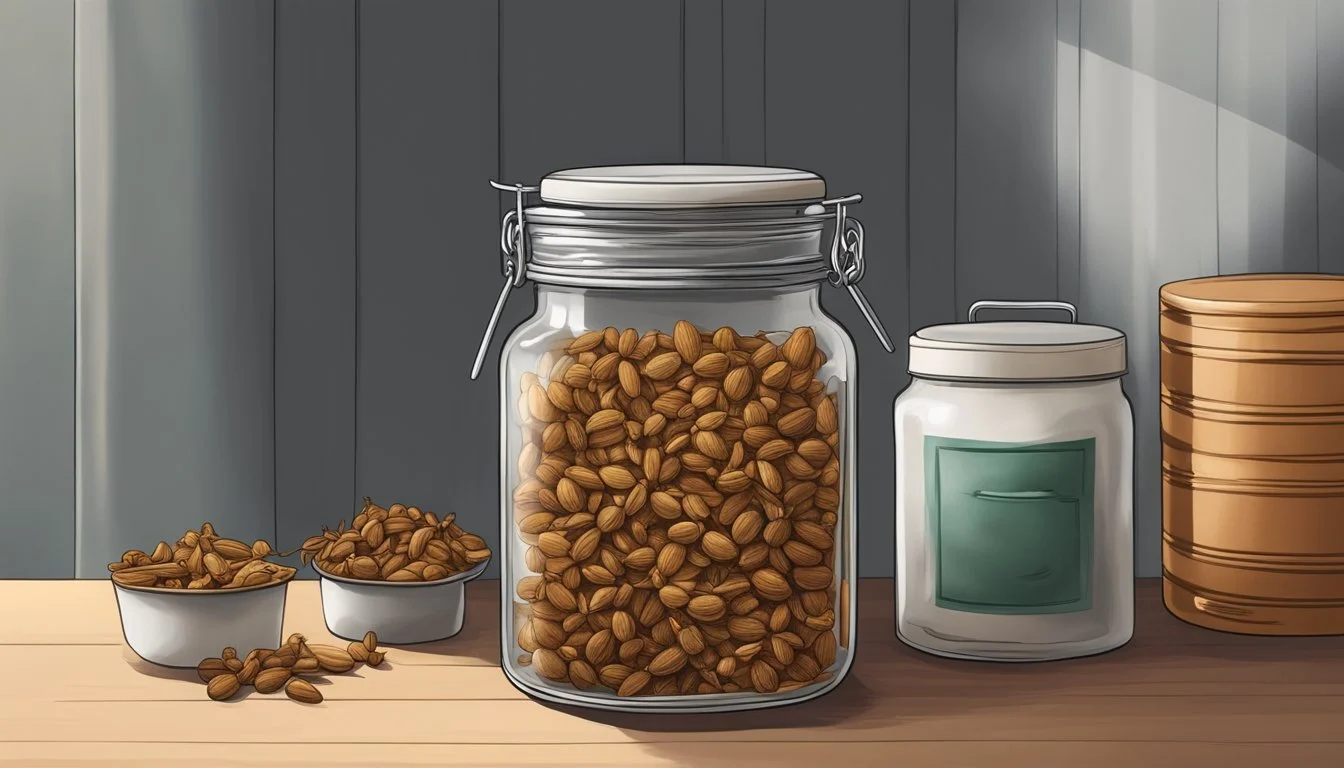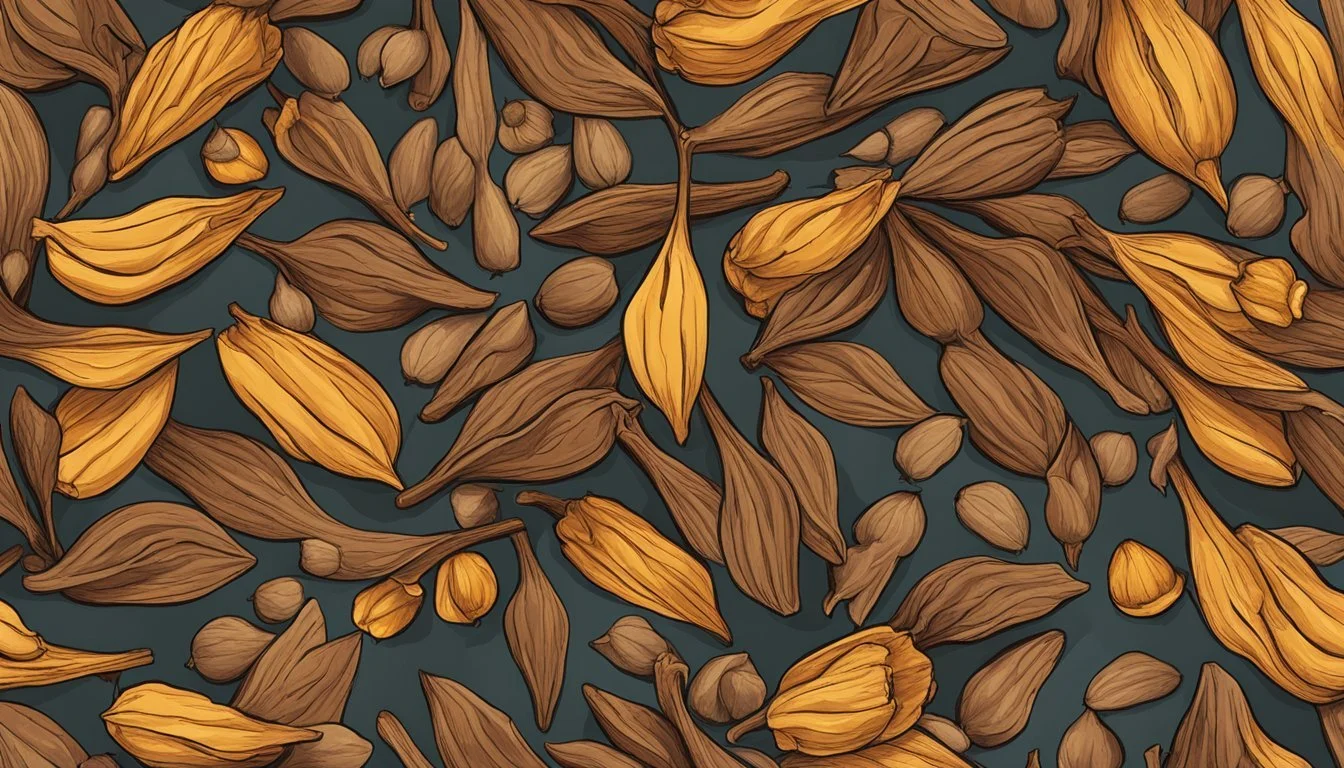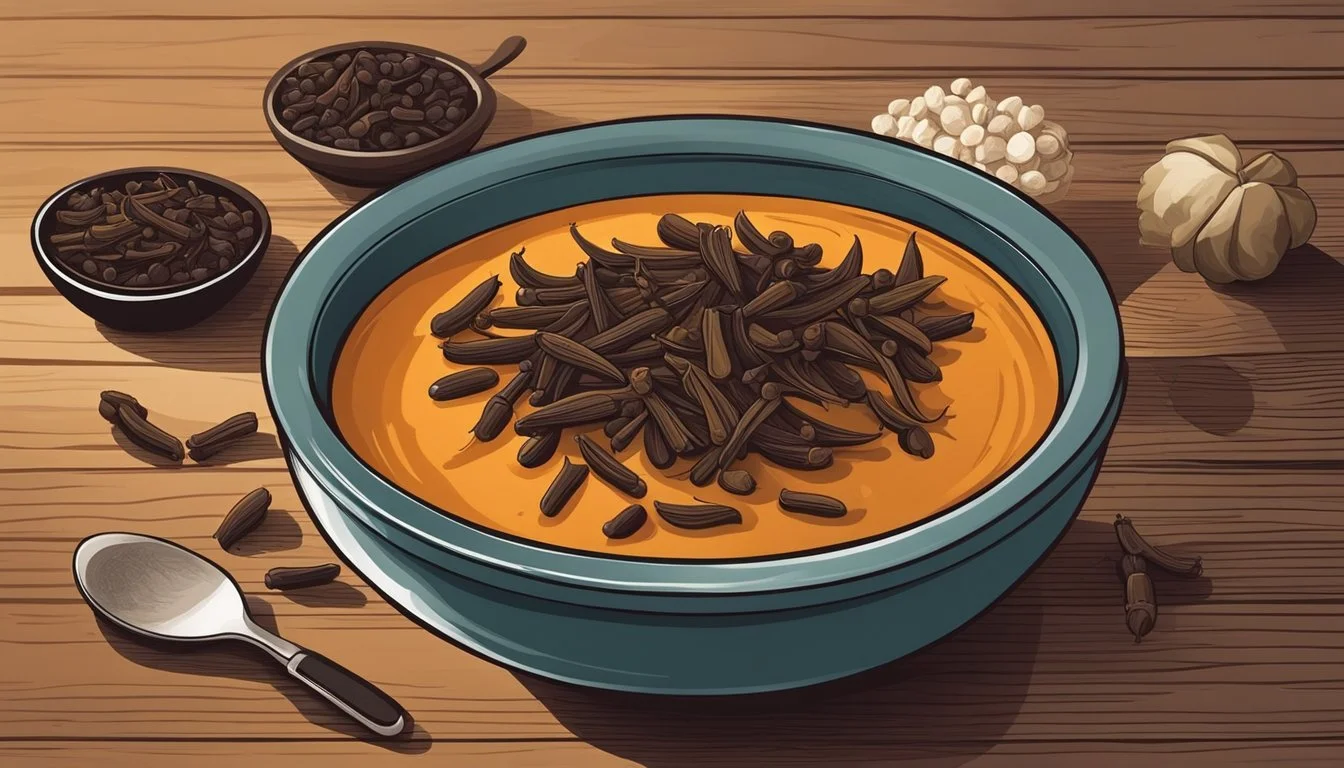How Long Do Cloves Last?
Shelf Life and Storage Tips
Cloves (how long do cloves last?), the aromatic flower buds of the Syzygium aromaticum tree, are a prized spice in cuisines worldwide for their intense fragrance and flavor. Beyond their culinary uses, cloves are also valued for their medicinal properties. However, like all spices, cloves have a finite shelf life, with various factors influencing their longevity. Whole cloves typically last longer than ground cloves due to the reduced surface area exposed to the elements, which can lead to loss of essential oils and flavor.
Understanding the shelf life of cloves is essential for both culinary enthusiasts and professionals. The longevity of cloves can be affected by how they are stored. To preserve their quality, cloves should be kept in a cool, dry place away from direct sunlight. When stored properly in an airtight container, whole cloves can retain potency for about a year, while ground cloves may begin to lose their flavor after a few months.
Given the correct storage conditions, whole cloves can potentially last for up to 3 years without significant degradation in quality. However, it is important to note that although cloves may not spoil in the traditional sense, they do gradually lose their flavor and aroma over time. Recognizing the signs of aging, such as a diminished scent or taste, can help determine when it might be time to replace them.
Understanding Cloves
Cloves are a potent spice with a rich history, diverse culinary applications, and notable health benefits. They come in whole and ground forms, each with its own uses and characteristics.
History and Culinary Uses
Cloves, the aromatic flower buds of the Syzygium aromaticum tree, have a history as rich as their flavor. Originating from the Maluku Islands in Indonesia, cloves have been traded internationally since ancient times. In the kitchen, cloves are celebrated for their intense fragrance and flavor, which is at once warm, sweet, and slightly astringent. They are a key component in spice blends like garam masala (how long does garam masala last?) and pumpkin spice, sharing the culinary stage with spices such as cinnamon, nutmeg (how long does nutmeg last?), and allspice. Whether studded into a ham, steeped in hot beverages, or ground into curries, cloves leave an indelible mark on dishes across the globe.
Health Benefits and Nutritional Profile
Cloves are more than just a culinary treasure; they are also recognized for their health benefits. They are rich in antioxidants and compounds such as eugenol, which has anti-inflammatory and antiseptic properties. Studies suggest that cloves may aid in digestion, help regulate blood sugar, and alleviate pain. The nutritional profile of cloves includes important vitamins and minerals, contributing to their inclusion in various traditional medicines.
Types of Cloves: Whole and Ground
There are two main types of cloves available for culinary and medicinal use: whole cloves and ground cloves. Whole cloves are the unground buds of the clove tree, frequently used for their aesthetic appeal and the gradual infusion of flavor they provide. Ground cloves, on the other hand, offer more immediate impact, dispersing their potent taste quickly throughout a dish. Both forms have their place in the kitchen, with the former often preferred for slow-cooked dishes and the latter for baked goods and spice mixes. Choosing between whole and ground cloves depends on the desired intensity and application in cooking.
Buying and Selecting Quality Cloves
When purchasing cloves, one seeks out options that promise the richest flavor and most potent aroma. Understanding how to evaluate cloves can lead to a more satisfying experience in their culinary use.
Evaluating Aroma and Flavor Potency
To assess the quality of cloves in terms of aroma and flavor, one should perform a sensory evaluation. Quality cloves will emit a strong, sweetly pungent scent that is unmistakable. Their flavor should be intensely warm and slightly astringent. Lightly crushing a clove between fingers will release its essential oils, providing a more accurate gauge of its potency.
Identifying Freshness
The freshness of cloves is a key indicator of their quality. They should appear oily and wholesome, without any signs of dryness or shriveling. Fresh cloves are also characterized by a rich brown color, and their stems should be intact, signifying that they have been handled properly. Freshness correlates directly to a longer shelf life, ensuring that the cloves retain their distinctive flavor for a longer period.
Where to Purchase Cloves
Cloves can be found in various outlets, but for the freshest options:
Grocery Stores: They offer cloves in both bulk and pre-packaged options. Look for organic sections or those dedicated to spices.
Specialty Spice Stores: These stores often provide high-quality, fresher cloves with knowledgeable staff to guide your selection.
Online Retailers: A convenient option with a wide selection, allowing one to source cloves from specific regions known for their quality.
When buying, one should consider that the source and handling of the cloves can greatly affect their freshness and, by extension, their flavor and aroma.
Storing Cloves for Longevity
Proper storage can significantly extend the shelf life of cloves, ensuring they maintain their flavor and aroma for longer periods. Adhering to ideal conditions and selecting appropriate containers will protect cloves from elements that can hasten spoilage.
Ideal Storage Conditions
Cloves should be kept in a cool, dry place, where the temperature is consistently between 50°F to 70°F (10°C to 21°C). Extreme temperatures, both hot and cold, can degrade the quality of cloves over time, so a pantry or a cupboard away from heat sources or sunlight is advisable. Maintaining a constant, moderate temperature is crucial for maximizing the shelf life of cloves.
Airtight Containers Vs. Plastic
For optimal preservation, cloves should be stored in an airtight container to prevent exposure to air and moisture, which can lead to a loss of potency and potential spoilage. Glass or metal tins with tight-sealing lids are preferred over plastic, as they offer a better barrier against odors and moisture. Plastic can be permeable and may not maintain the same level of protection over time.
Container Type Pros Cons Glass Non-permeable, does not retain odors Fragile, can be heavy Tin Durable, light-weight Can rust if exposed to moisture Plastic Lightweight, unbreakable Permeable, can absorb odors and flavors
The Impact of Light, Air, and Moisture
To further extend the shelf life and vitality of cloves, shielding them from light and air is essential. Light can diminish the essential oils that give cloves their distinct flavor, while air can oxidize and spoil them prematurely. Moreover, cloves should be protected from moisture, as it can lead to mold growth and deterioration of quality. Each of these elements can significantly shorten the shelf life and effectiveness of cloves, making it important to choose storage options that mitigate these risks.
Shelf Life of Cloves
The duration that cloves last depends on their form—whole or ground—and the conditions in which they are stored. Proper storage directly influences their freshness and longevity.
Whole Cloves Vs. Ground Cloves
Whole cloves typically maintain their quality longer than ground cloves due to their intact essential oils. Whole cloves can stay fresh for about 1 to 2 years when stored correctly. In contrast, ground cloves are more prone to oxidation and loss of flavor but can still be expected to last for up to 6 months.
Shelf Life in Pantry, Cupboard, Fridge, and Freezer
Pantry/Cupboard: The ideal location for cloves is a cool, dark, and dry place such as a pantry or cupboard. Whole cloves can last here for 1 to 2 years, and ground cloves for up to 6 months.
Fridge: Storing cloves in the fridge is possible if sealed in an airtight container to prevent moisture absorption. This can slightly extend their shelf life.
Freezer: While freezing is not commonly recommended, it’s possible for whole cloves if sealed properly but may not significantly extend shelf life beyond normal pantry conditions.
Expiration Date and Freshness
The expiration date on cloves' packaging provides a guideline for peak quality. The loss of aroma and flavor indicates diminished freshness, thus:
Whole cloves should retain their strong scent and flavor until the expiration date, often lasting well if stored ideally even past this date.
Ground cloves, once opened, will diminish in intensity quicker than whole cloves, and should ideally be used within 6 months for best flavor.
Maximizing Flavor and Potency When Cooking
When cooking with cloves, their rich flavor and potency are essential for creating depth in various dishes. Understanding how to incorporate cloves can significantly enhance the quality of a meal.
Recipe Considerations for Cloves
In every recipe, the quantity of cloves used should be measured with precision, as their intense flavor can easily dominate. A recipe might call for whole cloves, which are ideal for infusing and easily removed, or require ground cloves, which distribute flavor more evenly. Using fresh, whole cloves guarantees optimal potency, and they should be ground immediately before use to maintain their strength.
Using Cloves in Spice Blends
Spice blends benefit from the inclusion of cloves for their warm and aromatic qualities. When creating a blend, cloves should be used sparingly to complement, not overpower, other spices. For spice mixes that aim for balance, such as Garam Masala or Pumpkin Spice, cloves are critical but should remain a minor component to achieve harmony in flavors.
Table: Proportions in Common Spice Blends
Spice Blend Cloves Proportion Pumpkin Spice 1 part Garam Masala 1/2 part Apple Pie Spice 1/4 part
Pairing with Other Spices
Cloves pair exceptionally well with certain spices to create a symphony of flavors. They enhance the warmth of cinnamon, complement the sweetness of nutmeg, and can be balanced by the brightness of allspice. To unlock the full spectrum of clove’s taste, they should be used alongside these spices in festive dishes like pumpkin pie or braised meat recipes. Ground ginger also works well to add a slight heat and complexity when mixed with cloves.
List of Complementary Spice Pairings:
Cinnamon: Ideal for sweet and savory recipes.
Nutmeg: Enhances desserts and creamy sauces (What wine goes well with creamy sauces?).
Ginger: Adds a zesty twist to spice mixes.
Allspice: Balances the intensity in rich dishes (What wine goes well with rich dishes?).
Common Issues and Solutions
When storing cloves, individuals may encounter problems such as mold growth, the need for substitutes, and pests. This section addresses these issues and offers concrete solutions to ensure cloves remain usable for as long as possible.
Preventing and Identifying Mold
To prevent mold on cloves, they should be stored in an airtight container and kept in a cool, dry environment. Identifying mold involves looking for visible spots or a change in the texture or odor of the cloves. If any mold is detected, affected cloves should be discarded immediately to prevent the spread of mold spores.
Prevention Tips:
Ensure the storage area has low humidity.
Regularly check the cloves for signs of mold.
Keep cloves in a sealed container away from moisture.
Identification Signs:
Unusual spots or fuzz on the surface.
A musty smell, indicating mold presence.
Substituting Cloves in Recipes
Sometimes, cloves may not be available, or individuals may prefer to use an alternative. Nutmeg and cinnamon are common substitutes for cloves, offering a similar warm, spicy flavor profile.
Substitute Ratio:
For every teaspoon of ground cloves, use half a teaspoon of ground nutmeg or cinnamon.
Fighting Clove-Related Pests
Cloves can attract certain pests, such as ticks, if not stored correctly. To combat infestations, cloves should always be sealed tightly and inspected regularly.
Pest Control Steps:
Keep cloves in airtight containers to prevent pests from detecting the scent.
Check for any signs of pest presence, like bite marks or live insects, and if any are found, remove the affected cloves immediately.
Cloves in Traditional and Modern Cuisine
Cloves, with their pungent aroma and intense flavor, are a versatile spice that play a critical role in the culinary traditions of various cultures and are continuously being incorporated into modern dishes.
Role in Middle Eastern Cuisine
In Middle Eastern cuisine, cloves are a staple. They are often used in meat dishes, rice pilafs, and spice mixes, such as the baharat seasoning blend which combines cloves with other spices like paprika, cumin, and cinnamon. Lamb dishes frequently feature cloves to balance the gamey flavors with their warm and sweetly aromatic essence.
Innovative Uses in Western Cooking
Western chefs have embraced cloves to add depth to their culinary creations. Cloves have found their way into baking, infusing cakes, cookies, and bread with their rich flavor. They are also used in pickling recipes, accompanying other spices to create complex flavors. Innovative cooks experiment with cloves in savory dishes, combining them with herbs like thyme and rosemary to create a unique taste profile.
Cloves in Beverages
Cloves are a key ingredient in various beverages, both traditional and modern. They are essential in mulled wine, contributing to its warming character alongside cinnamon and orange slices. In other drinks, such as teas and ciders, cloves add a hint of spiciness and depth, enhancing the drink's aroma and palate. Even in coffee, cloves are sometimes introduced to create a distinctive flavor twist.
Processing and Grinding Cloves
Grinding cloves is integral to their use, and proper grinding techniques ensure maximum flavor and freshness. This section details methods using common kitchen tools, walks through the process step by step, and provides essential storage tips for preserving the spice's potency.
Using Spice Grinders and Mortar and Pestle
Spice Grinder: A spice grinder can efficiently transform whole cloves into a fine powder. It is recommended to pulse in short bursts to avoid overheating, which could cause the cloves to lose some of their essential oils. Mortar and Pestle: For those who prefer a manual approach, a mortar and pestle offer a more controlled and traditional method. Grinding cloves with a mortar and pestle allows for customized texture, from coarse to fine, depending on the duration and vigor of grinding.
From Whole to Powdered: Step by Step
Measurement: Begin by measuring the precise amount of whole cloves needed for a recipe. Starting with whole spices ensures the best flavor profile.
Toasting (Optional): Toasting cloves can enhance their aroma, but this step should be skipped if one prefers the raw, potent flavor.
Grinding:
For a spice grinder, fill the bowl with whole cloves, ensuring not to overcrowd, and pulse until the desired texture is achieved.
When using a mortar and pestle, place cloves in the mortar and grind with a firm, circular motion until fine.
Storing Freshly Ground Cloves
To maintain freshness, store the freshly ground cloves in an airtight container away from direct sunlight, moisture, and heat. Cloves are sensitive to these elements, which can significantly diminish their flavor and potency. An optimal storage location would be a cool, dry place, ideally within a spice cabinet that maintains a consistent temperature between 50°F to 70°F (10°C to 21°C).










